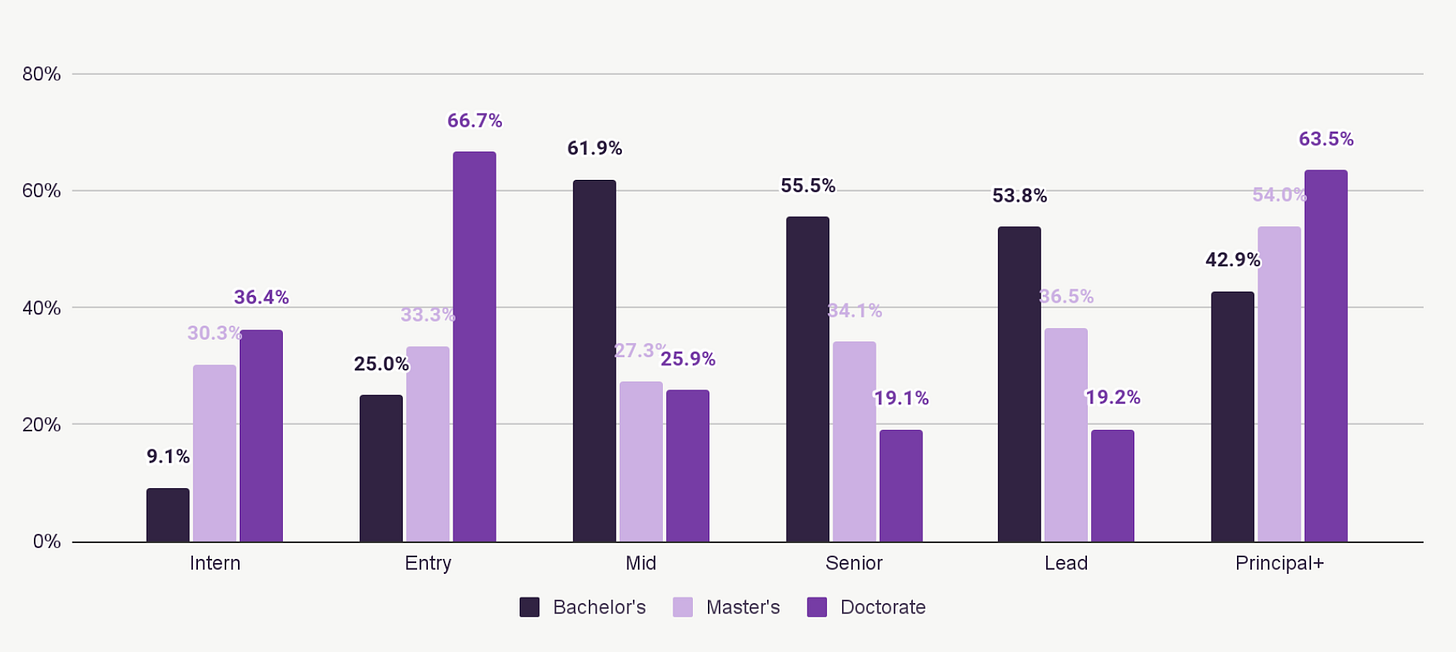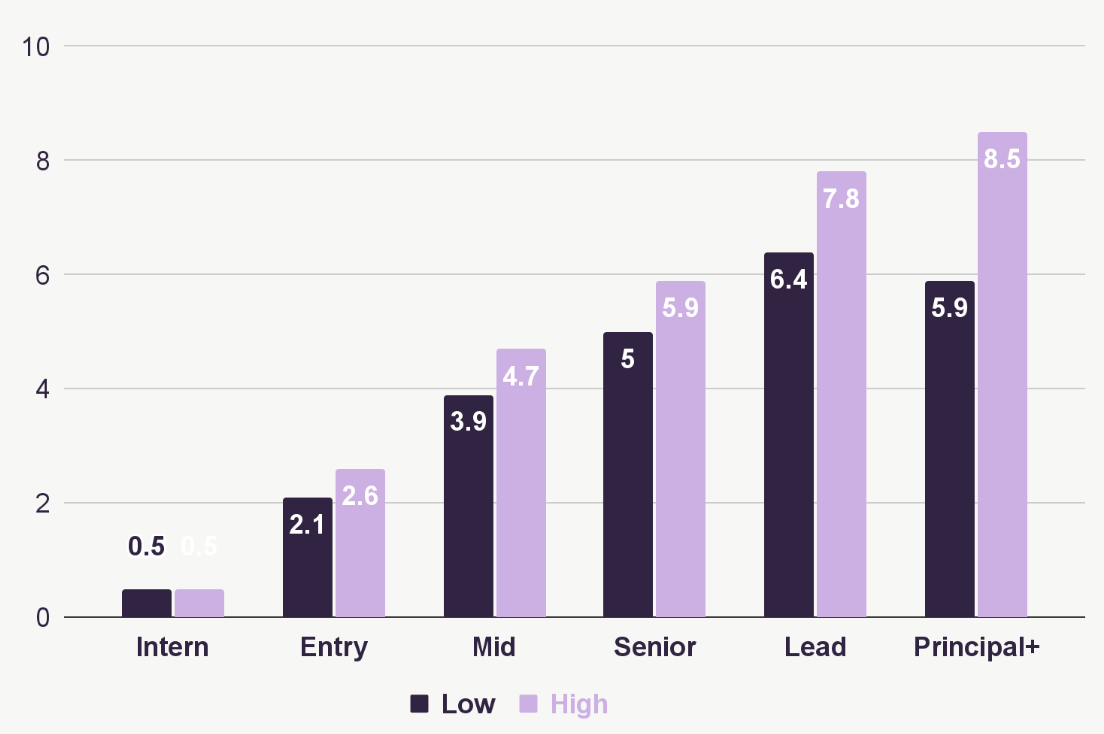Qualifications, education, and experience benchmarks for UX research roles
Building a data-driven UX research career ladder: Part II
UX researchers lack clear, company-agnostic benchmarks for the qualifications and responsibilities required at different seniority levels, making it challenging to gauge their career progression. Additionally, many leaders in product development and UX teams struggle to define career progression for their UX researchers. To address these issues, we created a data-driven career ladder with benchmarked requirements and responsibilities at each level.
In the first article of this series, we explained our approach to collecting and analyzing ~1,400 user research job descriptions, introduced the data-driven career ladder (summarized in the table below), and identified five trends in the metadata from these job postings. In this article, we focus on the analysis that informed the qualifications summary below, specifically examining the educational background, degree level, and years of experience for UX research positions at each level of seniority.

Degrees and educational background
Degree levels and fields of study are mentioned in many job postings. A key consideration for those early in their careers is whether to pursue an advanced degree. Our data shows that 48% of individual contributor (IC) roles mention an advanced degree (Master’s or Doctorate), while 54% mention a Bachelor’s degree. Although a little less than half of job postings explicitly list an advanced degree, it’s worth noting that an estimated 69% of UX researchers hold a Master’s or PhD.
When examining these data by seniority level, definitive trends are difficult to identify. Interestingly, job postings for Entry and Principal-level IC roles mentioned doctoral degrees more frequently than those for other seniority levels. This may suggest that advanced degrees are particularly helpful in the earliest stages of one’s career and for the most senior IC levels. The additional educational training may help early-career practitioners stand out in a competitive marketplace, and assist senior-level researchers in advancing to the next level. As we collect more data, we’ll revisit these findings and inspect whether any other trends emerge.
Management roles mention Bachelor’s degrees less often than IC roles (33% versus 54%) but mention advanced degrees with similar frequency (41%). While our analysis of management roles by seniority level, seen below, is limited due to small sample sizes, future data collection will help clarify whether degree requirements vary across management levels.
Degree level is one important aspect of a practitioner's qualifications, but their field of study is potentially more important — different disciplines impart distinct skills and knowledge. We classified job descriptions by degree focus areas to examine which majors appeared most frequently.
A wide variety of fields, such as media studies and design, were present in the sample, but the three that emerged as the most frequent were psychology, human-computer interaction (HCI), and human factors. This isn’t surprising — these fields are all directly related to studying people, how they think, and how to design technology to suit them. This is also a durable finding, as the same three disciplines were identified as the most common in prior research.
While not the sole determinant of success, educational background and degree level are key influences that shape a UX researcher’s career. If you’re planning your education, or if you’re advising a current student aspiring to a UX research career, choosing to study Psychology, HCI, or HF may provide the strongest foundation. However, if someone studied a different field, particularly in the social sciences or design, they could still be well-suited for a career in UXR.
Years of experience
While educational background and degree level are important, years of experience (YOE) are often a better indicator of seniority. Our analysis of job postings reveals a clear progression where required experience increases steadily with seniority. Years of experience is often presented as a range, with high and low values (e.g., “This role requires 3–5 years of experience in usability research”). The graph below summarizes the experience data for IC roles.
The data show that YOE increases consistently with seniority level. For example, intern positions require less than a year of experience, while senior roles like Principal or Staff (combined as “Principal+”) require an average of eight and a half years.
The trend is similar for management positions, where YOE gradually increases from Manager to Senior Manager to Director and above. This data also gives perspective on the years of experience needed before entering the managerial track—practitioners typically reach the Senior to Lead IC level with about seven years of experience before transitioning to management roles.
A closer look at the data reveals a slight dip in the “low” end (the dark purple bars) of the experience range for high-level IC positions (e.g., Principal at 5.9 years versus Lead at 6.4 years) and Managers (4.8 years versus Senior ICs at 5 years). A qualitative review of the job postings showed that this dip can be attributed to the addition of secondary skill sets at higher seniority levels. For instance, a Senior Manager job might specify, “This role requires 10+ years of relevant experience with both qualitative and quantitative techniques, and 5 or more years of directly managing, coaching, and developing full-time researchers." The addition of a second set of qualifications, with its own experience range, accounts for the dip in our graphs.
Overall, YOE is a strong indicator of seniority level in UXR roles. These data help inform our understanding of the UXR career ladder and provide benchmarks for the typical experience required at each level. While total years of experience with applied UX research steadily increase with seniority, higher-level IC and management positions often require a second skill set (e.g., 3–5 years of experience with people management, or advanced research skills like quantitative analysis and statistics).
The bottom line
We created the data-driven career ladder to help UX research practitioners navigate their careers with confidence and clarity, and assist leaders in constructing reasonable and informed levels for their teams. By analyzing ~1,400 job postings, we identified key trends and benchmarks for UXR role qualifications and how they change throughout the career journey, including:
Advanced degrees are listed in just under half (48%) of IC UX research roles. This number may under-emphasize the importance of an advanced degree, as about 69% of UX professionals report having a Master’s or Doctoral degree.
Advanced degrees are mentioned more frequently in job postings for entry and very senior-level IC roles (like Staff or Principal). A Master’s or PhD may be particularly beneficial for entry-level researchers seeking to stand out in a competitive market and senior-level researchers seeking advancement into higher-level positions.
Management positions are less likely to mention Bachelor’s degrees compared to IC roles. An advanced degree may help position oneself for managerial positions.
Psychology, HCI, and Human Factors are the most commonly sought-after degree fields for UX researchers. Those making educational decisions, or advising current students, should strongly consider these fields. However, anyone who has a background in the social sciences or digital design may find a place in user research.
Years of experience increase steadily with seniority level for IC and management positions. Readers should use the benchmarks above to understand what is typical at each level across the career progression.
Higher-level IC positions and management positions often require the development of a second skill set that sometimes takes the form of an additional YOE requirement (e.g., “10 years of UX research and 3 years of team management”)
In the next, and final, article of this series, we’ll explore how responsibilities shift throughout a UX researcher’s career, focusing on four key areas: the level of hands-on research work, time spent enabling other researchers, emphasis on mentorship and talent management, and collaboration dynamics.












